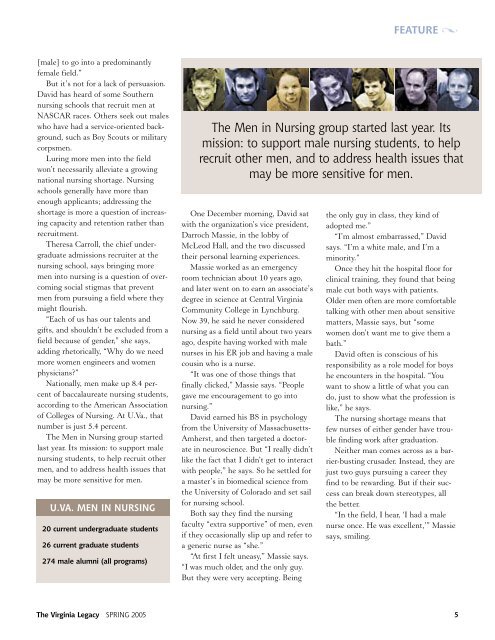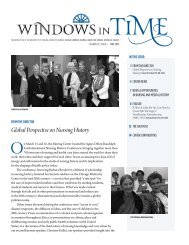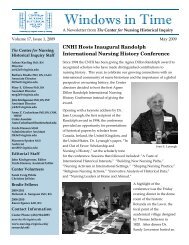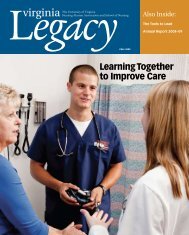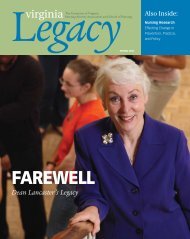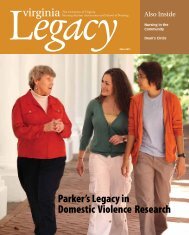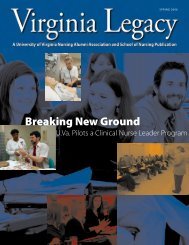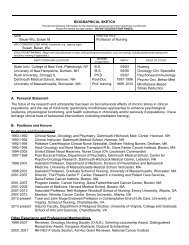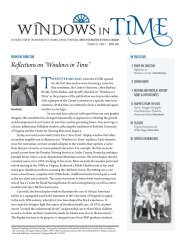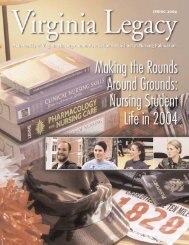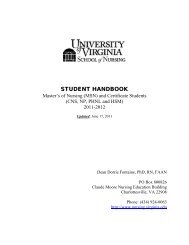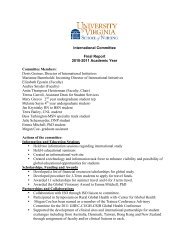Legacy 2005 Spring - School of Nursing - University of Virginia
Legacy 2005 Spring - School of Nursing - University of Virginia
Legacy 2005 Spring - School of Nursing - University of Virginia
Create successful ePaper yourself
Turn your PDF publications into a flip-book with our unique Google optimized e-Paper software.
FEATURE [male] to go into a predominantlyfemale field.”But it’s not for a lack <strong>of</strong> persuasion.David has heard <strong>of</strong> some Southernnursing schools that recruit men atNASCAR races. Others seek out maleswho have had a service-oriented background,such as Boy Scouts or militarycorpsmen.Luring more men into the fieldwon’t necessarily alleviate a growingnational nursing shortage. <strong>Nursing</strong>schools generally have more thanenough applicants; addressing theshortage is more a question <strong>of</strong> increasingcapacity and retention rather thanrecruitment.Theresa Carroll, the chief undergraduateadmissions recruiter at thenursing school, says bringing moremen into nursing is a question <strong>of</strong> overcomingsocial stigmas that preventmen from pursuing a field where theymight flourish.“Each <strong>of</strong> us has our talents andgifts, and shouldn’t be excluded from afield because <strong>of</strong> gender,” she says,adding rhetorically, “Why do we needmore women engineers and womenphysicians?”Nationally, men make up 8.4 percent<strong>of</strong> baccalaureate nursing students,according to the American Association<strong>of</strong> Colleges <strong>of</strong> <strong>Nursing</strong>. At U.Va., thatnumber is just 5.4 percent.The Men in <strong>Nursing</strong> group startedlast year. Its mission: to support malenursing students, to help recruit othermen, and to address health issues thatmay be more sensitive for men.U.VA. MEN IN NURSING20 current undergraduate students26 current graduate students274 male alumni (all programs)The Men in <strong>Nursing</strong> group started last year. Itsmission: to support male nursing students, to helprecruit other men, and to address health issues thatmay be more sensitive for men.One December morning, David satwith the organization’s vice president,Darroch Massie, in the lobby <strong>of</strong>McLeod Hall, and the two discussedtheir personal learning experiences.Massie worked as an emergencyroom technician about 10 years ago,and later went on to earn an associate’sdegree in science at Central <strong>Virginia</strong>Community College in Lynchburg.Now 39, he said he never considerednursing as a field until about two yearsago, despite having worked with malenurses in his ER job and having a malecousin who is a nurse.“It was one <strong>of</strong> those things thatfinally clicked,” Massie says. “Peoplegave me encouragement to go intonursing.”David earned his BS in psychologyfrom the <strong>University</strong> <strong>of</strong> Massachusetts-Amherst, and then targeted a doctoratein neuroscience. But “I really didn’tlike the fact that I didn’t get to interactwith people,” he says. So he settled fora master’s in biomedical science fromthe <strong>University</strong> <strong>of</strong> Colorado and set sailfor nursing school.Both say they find the nursingfaculty “extra supportive” <strong>of</strong> men, evenif they occasionally slip up and refer toa generic nurse as “she.”“At first I felt uneasy,” Massie says.“I was much older, and the only guy.But they were very accepting. Beingthe only guy in class, they kind <strong>of</strong>adopted me.”“I’m almost embarrassed,” Davidsays. “I’m a white male, and I’m aminority.”Once they hit the hospital floor forclinical training, they found that beingmale cut both ways with patients.Older men <strong>of</strong>ten are more comfortabletalking with other men about sensitivematters, Massie says, but “somewomen don’t want me to give them abath.”David <strong>of</strong>ten is conscious <strong>of</strong> hisresponsibility as a role model for boyshe encounters in the hospital. “Youwant to show a little <strong>of</strong> what you cando, just to show what the pr<strong>of</strong>ession islike,” he says.The nursing shortage means thatfew nurses <strong>of</strong> either gender have troublefinding work after graduation.Neither man comes across as a barrier-bustingcrusader. Instead, they arejust two guys pursuing a career theyfind to be rewarding. But if their successcan break down stereotypes, allthe better.“In the field, I hear, ‘I had a malenurse once. He was excellent,’” Massiesays, smiling.The <strong>Virginia</strong> <strong>Legacy</strong> SPRING <strong>2005</strong> 5


